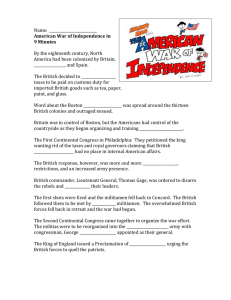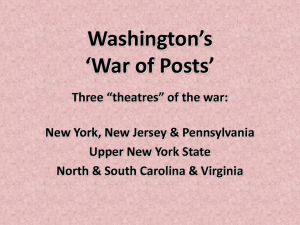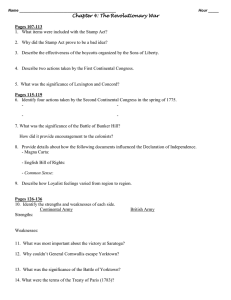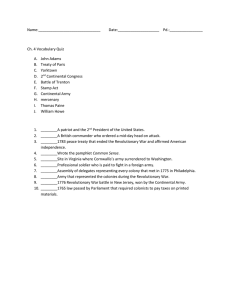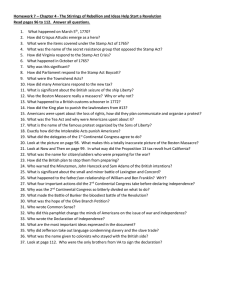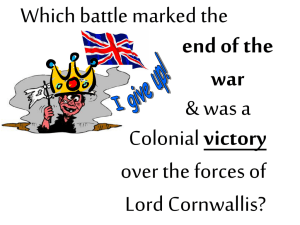AP History – Chapter 6 Vocabulary – Derek Hommel
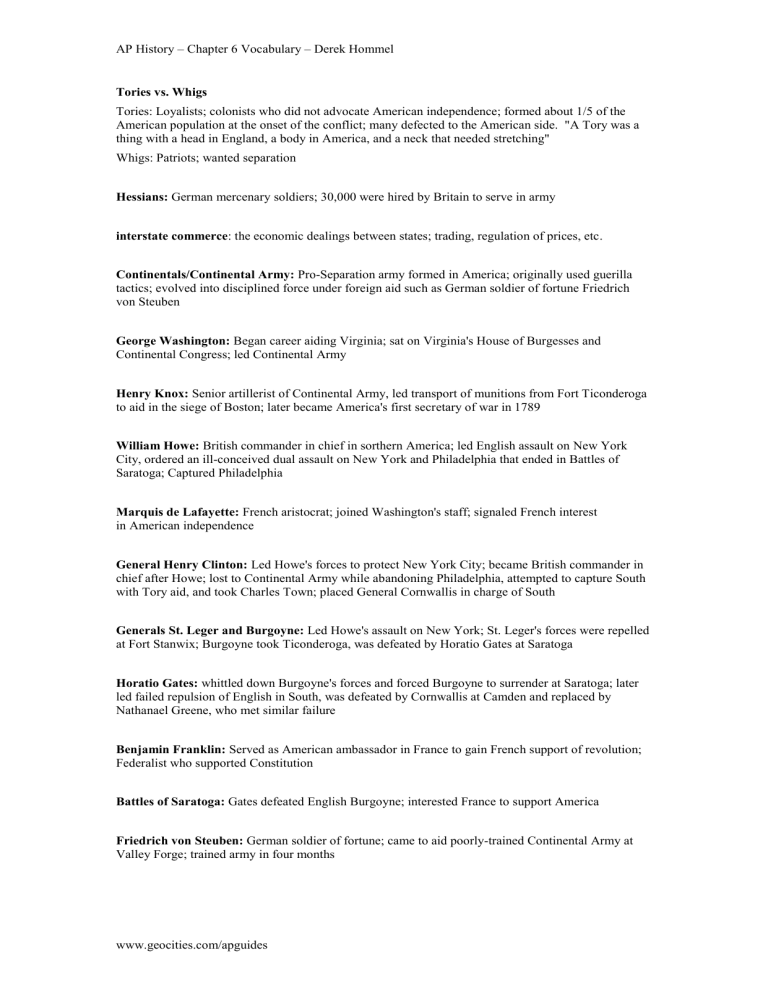
AP History – Chapter 6 Vocabulary – Derek Hommel
Tories vs. Whigs
Tories: Loyalists; colonists who did not advocate American independence; formed about 1/5 of the
American population at the onset of the conflict; many defected to the American side. "A Tory was a thing with a head in England, a body in America, and a neck that needed stretching"
Whigs: Patriots; wanted separation
Hessians: German mercenary soldiers; 30,000 were hired by Britain to serve in army interstate commerce : the economic dealings between states; trading, regulation of prices, etc.
Continentals/Continental Army: Pro-Separation army formed in America; originally used guerilla tactics; evolved into disciplined force under foreign aid such as German soldier of fortune Friedrich von Steuben
George Washington: Began career aiding Virginia; sat on Virginia's House of Burgesses and
Continental Congress; led Continental Army
Henry Knox: Senior artillerist of Continental Army, led transport of munitions from Fort Ticonderoga to aid in the siege of Boston; later became America's first secretary of war in 1789
William Howe: British commander in chief in sorthern America; led English assault on New York
City, ordered an ill-conceived dual assault on New York and Philadelphia that ended in Battles of
Saratoga; Captured Philadelphia
Marquis de Lafayette: French aristocrat; joined Washington's staff; signaled French interest in American independence
General Henry Clinton: Led Howe's forces to protect New York City; became British commander in chief after Howe; lost to Continental Army while abandoning Philadelphia, attempted to capture South with Tory aid, and took Charles Town; placed General Cornwallis in charge of South
Generals St. Leger and Burgoyne: Led Howe's assault on New York; St. Leger's forces were repelled at Fort Stanwix; Burgoyne took Ticonderoga, was defeated by Horatio Gates at Saratoga
Horatio Gates: whittled down Burgoyne's forces and forced Burgoyne to surrender at Saratoga; later led failed repulsion of English in South, was defeated by Cornwallis at Camden and replaced by
Nathanael Greene, who met similar failure
Benjamin Franklin: Served as American ambassador in France to gain French support of revolution;
Federalist who supported Constitution
Battles of Saratoga: Gates defeated English Burgoyne; interested France to support America
Friedrich von Steuben: German soldier of fortune; came to aid poorly-trained Continental Army at
Valley Forge; trained army in four months www.geocities.com/apguides
AP History – Chapter 6 Vocabulary – Derek Hommel
George Rogers Clark, John Bowman and Daniel Brodhead: led militiamen against the Ohio Indians in Kentucky and other western areas
Joseph Brant: Pro-British Mohawk leader, skilled diplomat and educated man; organized northwest
Indians into military alliance to exclude whites from Ohio River; John Sullivan's campaign lost his
Iroquois support
John Sullivan: fought against Joseph Brant; only battle was in NY's Elmira, where his artillery made short work of the Indians; led campaign against natives and burned two dozen villages and torched a million bushels of corn, forcing the natives into starvation
General Cornwallis vs. Nathanael Greene: Cornwalllis was placed in charge of England's southern campaign by Clinton; Cornwallis repelled Horatio Gates; America sent Nathanael Greene to defeat
Cornwallis; Greene persued Cornwallis to Virginia; Clinton wanted Cornwallis to return to Charles
Town, but he instead set up base near Yorktown, VA. French De Grasse and Lafayette took Yorktown while Washinton held Clinton at bay in New York
Yorktown : Battle where British Cornwallis was defeated; French forces led by De Grasse and
LaFayette, along with Americans, forced Cornwallis to surrender while Washington prevented reinforcements from New York
Peace of Paris: Cornwallis' defeat signalled end of English will; peace talks began June of 1782. John
Adams, John Jay, Benjamin Franklin principal diplomats for America. Britain gave America all lands east of Mississippi. Spain received ambiguous rights to Florida. Americans created hassles by not reimbursing Tory damages and preventing British creditors from collecting prewar debts, likewise
Britain refused to return slaves confiscated by its troops
"Natural Aristocracy" : 'those who had demonstrated fitness for government service by personal accomplishments'; seen as ideal candidates for America; opposed to hereditary rule; e.g. Benjamin
Franklin, John Hancock
Benjamin Banneker : Maryland free black; self-taught mathematical and astronomer; served on commission that designed Washington, DC; published series of almanacs
African Methodist Episcopal church : started by black Methodists in Philadelphia in 1787; became
'African Methodist Episcopal church' in 1816; black churches had origins in Revolutionary period
Abigail Adams : to husband: "to be adept in the art of Government is a prerogative to which your sex lay almost exclusive claim"; political commentator and collaborator with husband John Adams
Primogeniture: the legal practice of awarding the first son all property if a man died without a will;
Jefferson sought to abolish the practice in Virginia; the practice was later abolished in all states
Entails: legal requirements that prevented heirs and their descendants from dividing their property; used so rich families kept their wealth; Jefforson combated this so that rich families could not consolidate power and become overbearing aristocracy; by 1791, 11 states had banned the practice
Statute for Religious Freedom: Jefferson's plea that established religions should be abolished on the grounds that people will continue to go on their on volition; "Truth is great... and will prevail if left to itself" www.geocities.com/apguides
AP History – Chapter 6 Vocabulary – Derek Hommel
Articles of Confederation: drafted by John Dickinson ; Congress ratified weakened version; sought to provide weak structure where state governments ruled themselves; instituted single-chambered national
Congress and taxes could not be passed unless all states ratified it; all states but Maryland ratified it;
Maryland ratified it after northwestern areas were given up by states
Newburgh Conspiracy : Robert Morris, superintendent of finances, and NY Congressman John
Hamilton persuaded army officers to "threaten" a coup for their pay unless treasury gained right to gain revenue through taxes; Washington persuaded troops not to participate; unsuccessful
Ordinance of 1785 : established by Congress to settle lands north of Ohio River; divided townships into six-miles-square plots; further divided townships into 36 plots of 640 acres
Northwest Ordinance of 1787 : established by Congress to define steps to becoming state; set aside land north of Ohio River as NW Territory; forbid slavery as a territory, though could be established when became state; steps as follows: Congress appoints territorial judges and governors initially;
5000+ adult males, people could write temporary constitution and elect legislature; 60,000+ population, they could write state constitution to be approved by Congress before becoming state
Shay's Rebellion : Daniel Shays led 2000 men to shut down courts in Massachusetts, whom he considered "tyrannical"; by closing courts he hoped to stop foreclosures on farm mortgages and auctions for unpaid taxes, which threatened the relatively poor farmers; stopped by state troopers with little bloodshed after a few skirmishes
Virginia Plan: By James Madison; gave Congress almost unlimited power over legislation and taxation, to veto laws and use military might against states; bicameral legislature with both houses filled by proportion of state population; favorable to Virginia, a heavily-populated state
New Jersey Plan: by William Paterson; proposed single-chambered legislature with every state having equal vote, just as Articles of Confederation
Connecticut Compromise : proposed originally by Connecticut delegation; became Constitution of
United States; Senate had equal vote by all states, House of Representatives was filled proportional to state
Checks and Balances and separation of powers : checks and balances :
Legislative: Senate and House could block each other; made laws; could overrule President's veto with
2/3 majority vote in both houses
Executive: President named his own Cabinet at Senate approval; could veto any bills passed by
Senate/House; could be voted out by Congress for "High Crimes"
Judicial: lifetime appointment of Federal judges
Checks and balances made sure no one branch could dominate the other two
Federalists vs Antifederalists : Federalists were pro-Ratification for Constitution, implying that
Constitution balanced state and Federal power; Antifederalists argued Constitution did not balance
Federal and state powers, thought Constitution would doom states; Federalists won out because of higher funding and popularity such as Washington and Franklin, and had support of most newspapers www.geocities.com/apguides
AP History – Chapter 6 Vocabulary – Derek Hommel
Federalist Papers : series of essays written by John Jay, Alexander Hamilton and James Madison; argued that Constitution had dual purposes: to defend a minority's rights against a tyrannical majority, and to prevent a stubborn minority from denying measures beneficial to the majority; Madison argued that by unifying the country, the population itself would create a majority to outwiegh any attempt by a small political faction to pass unwise laws
*The following are dictionary definitions: mercenaries : those hired by a foreign army; eg. the Hessians in the British army emancipation : the act of freeing from bondage, oppression or restraint sovereignty : the ability to rule completely; freedom of independence; authority or rule ideology : the ideas that reflect or embody the social needs or standings of a group, society or race compact : an agreement or covenant; usually to unite a group confederation : a political union between states; usually between self-governing state bodies anarchy : absence of any form of government or law confiscate : to sieze private property for the public treasury egalitarian : a [government] advocating political, economic and legal equality for all peers : one who has equal standing with another; sometimes refers to a nobleman republic: a government where officials elected by the people govern the populace connotations : a second meaning suggested by a word other than its literal meaning prorogue : to discontinue a session of a legislative session ratification : the act of giving formal approval or acceptance agrarian : pertaining to agriculture; pertaining to land and its ownership www.geocities.com/apguides
